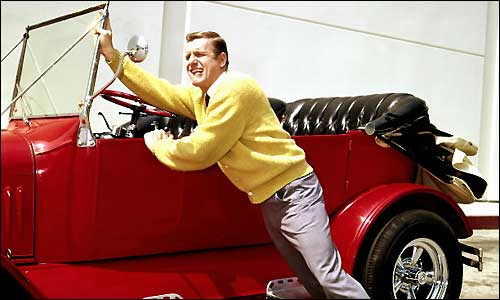
Posted on 05/24/2006 12:29:25 AM PDT by BlueSky194
In 1996 a number of EV-1 electric cars began appearing on California's highways. The General Motors-produced vehicle was fast, ran quietly, produced no polluting exhaust and it ran without gasoline and then, suddenly, it was gone.
The documentary, Who Killed the Electric Car?, from producer Dean Devlin and filmmaker Chris Paine, chronicles the life and mysterious death of the groundbreaking vehicle, examining its cultural and economic ripple effects and how they reverberated through the halls of government and big business. Filmmakers make the case that the death of the EV-1 was, in fact, a murder. They claim to show that production of the revolutionary car was halted due to pressure from industries that would be harmed by the proliferation of electric car technology.
Who Killed the Electric Car?, a 2006 selection at the Tribeca and Sundance film festivals, interviews and investigates automakers, legislators, engineers, consumers and car enthusiasts from Los Angeles to Detroit, to work through motives and alibis, and to solve the complex mystery.
Who Killed the Electric Car?, from Sony Pictures Classics, opens in New York and L.A. on June 28 and will further expand this summer. It's been rated PG for "brief mild language."
Either it was the Bilderbergers or it's a technology that simply isn't feasible, unless we derive electricity from nuclear power. Yup, definitely the Bilderbergers.
That was what was going through my mind. That, and Mac vs. PC.
Sometimes, there are other factors involved. Like marketing.
But I think the real constraint on the electric car was battery life and range.
And possibly the perceived danger of what would happen to the batteries during an accident.
I'd be curious where VHS is in a few years.
''We do, we doooo!''
Yeah, it'd be awful to replace gasoline with something that could explode or catch fire in an accident. /s
the electric car killed itself. actually, it was never alive to begin with. it was a myth.
I'd be curious where VHS is in a few years.
I'll tell where it isn't... It isn't used as a professional broadcast format, which is what Beta became with some modifications after it died as a consumer format.
Actually electric cars are ubiquitous. You just have to go where they are.
A major consumer of electric cars are golf courses. All golf cars are electric.
Their siblings are very widely used by industry to shuttle people around within industrial plants. There are lots of similar cars in trailer and RV communities to move about within the area. There are also smaller electric scooters used extensively to move around in large industrial installations.
Muscular versions are hard at work on docks and other locations in plants carrying the products being manufactured. A large fraction of forklifts are electric cars on steroids.
The electric car is alive and well.
LOL. . /but you know 'truth does not matter - GW will be blamed, anyway ;^)/
Acid burns. You ever been burned by sulphuric acid? And in the electric car models I saw, the batteries were right under the seats.
That'd be as bad as putting the gas tank under the seats. Why not put them over the drive wheels for traction?

I wasn't the engineer - don't ask me!
Ah, and this is the consistent problem these days with people, both general and political.
Today, everyone thinks everything is possible. Seems polar opposite of 100+ years ago where nothing was possible ("get a horse", "it'll never fly").
You know the dictum about "you can't legislate morality"? Well, alot of that is hogwash, but a solid truth to tell these know-nothing morons is "you can't legislate technological progress"!
Good point. Those utility vehicles are typically in a 'fleet' (there are others to use while some are charging), they typically need to be zero emission (inside use or odorless requirement), their use is short-range and on-site, and they're very basic machines. They successfully and cost-effectively fill those particular needs. And, we don't see testosterone-spiking commercials for hemi-powered golf carts smoking the course.
Yeah and when that sucker got tangled up............wow what a ball of wiring.
Made the debacle in Chevy Chases' Christmas Vacation movie look rather tame by comparison.
:)
Watching Jay Leno drive his c. 1910 Stanley shows just how fast these things are (acceleration-wise). Steam is incredible; if a tiny box on the front of a giant steamer locomotive and 200-car long train can propel that entire train at even 55 mph for hours, you know steam is incredibly powerful.
However, there were/are problems implementing it on a small scale. Even the best flash-point steamers like Doble - the last to die out - had trouble especially with STEAM-UP TIME. You have to wait a significant amount of time to get going - just like electrics. This is the same for locomotives (which had different mechanisms for heating, of course) - they take a long time to "warm up". It's also why they would absolutely continue running between reasonably spaced jobs - turning it down and up again would waste alot of fuel and time.
Steam is a great idea - better than electric, in general, I think - but someone has to come up with a way to warm it up "instantly" and efficiently (you need something to make steam - fuel or electric), primarily.
Disclaimer: Opinions posted on Free Republic are those of the individual posters and do not necessarily represent the opinion of Free Republic or its management. All materials posted herein are protected by copyright law and the exemption for fair use of copyrighted works.